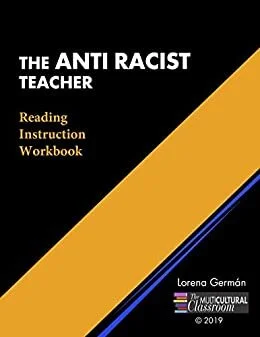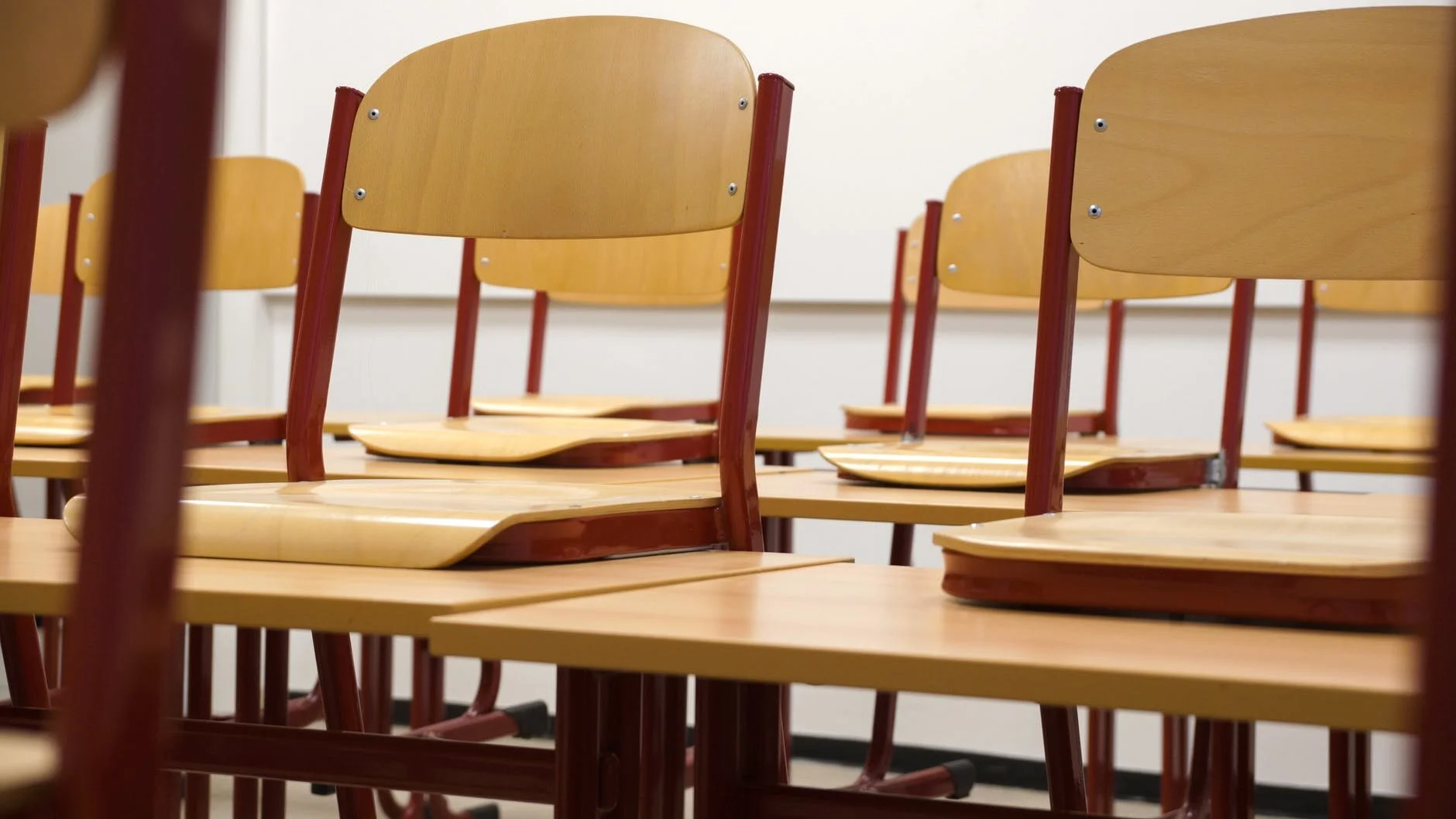Ep. 68: Throw Out the White Canon #DisruptText Part II w/ Lorena German
Note to listeners: This episode was recorded in mid-February as a part II to episode 65 “Throw Out the White Cannon #DisruptTexts
Shortly after this recording, Lorena German was featured in The New York Times “Bringing A New Vibe to the Classroom.”
EQ: What does it mean to teach in multicultural and multilingual classrooms and communities in 2020?
Guest: Lorena German, classroom educator and Chair of the National Council of English Teacher’s Committee Against Racism and Bias in the Teaching of English and co-founder of #DisruptTexts
In this episode, Lorena explains the origins of The Multicultural Classroom and its mission: “we aim to address the national issue of effectively teaching in multicultural and multi-lingual classrooms and communities. We believe that a culturally sustaining pedagogy can be practiced through targeted professional development.” Lorena also digs into her work on the NCTE Committee Against Racism & Bias and how it’s helped her advance her vision of effective and compassionate teaching in multicultural/multilingual classrooms. She talks about her role in co-founding #DisruptTexts with Julia Torres and Tricia Ebarvia and future projects she’s looking forward to. Read her post “Disrupting Shakespeare”.
Champagne 🥂 & Real Pain 👎🏻
🥂 The Love & Lies of Rukhsana Ali by Sabina Khan
🥂 Black educators on Twitter (i.e. Kelly Wickham Hurst)
👎🏻 Revisionist history and people beating the drum about white history
Do Your Fudging HW:
Hope: Check out our links in these show notes and Lorena’s work! Go buy her book “The Anti-Racist Reading Instruction Workbook”
Annie: “School Segregation is Not a Myth” by Will Stancil from The Atlantic
Lorena: people of color - do the thing. We need you and we need your voice. If you benefit from white privilege, be an accomplice at work and support your coworkers of color.
Follow Lorena on Twitter
Follow us on Twitter @IWL_Podcast or Facebook: Interchangeable White Ladies Podcast
Ep. 67: What A Pandemic Reveals About Education Equity--Teaching & Learning During the Covid-19 Outbreak
Note to listeners: This episode was recorded on Saturday March 14. Some information may have changed by the date this was published. Unfortunately, due to timezone issues, Annie was unable to join the discussion.
EQ: What has this pandemic revealed about issues of equity and access in education?
Guests: Aaron Shelby, Secondary Curriculum Coordinator, and Amy Daraiseh, Learning Support at the American School of Abu Dhabi.
Weeks ago, educators in East Asia transitioned to virtual teaching, offering synchronous (live) and asynchronous learning opportunities for students kindergarten through university level. Many international teachers kept tabs on this progression, perusing social media for what was inevitably coming to all of us. Concerns about teaching students with special needs, supporting English language learners, and managing poor internet connection across the globe were hot topics on many message boards. For better or for worse, it seemed the US was living blissfully in denial of the impending virus that would sweep the nation and ask educators to re-examine what it means to teach and to learn in the midst of a pandemic.
To get some perspective on the logistics of remote learning, listen to the conversation “Teaching Online During the Covid-19 Outbreak” Nate Bowling had with two teachers, Jordan Moog and Michele Curley, from the American School of Abu Dhabi.
In this episode, two of Hope’s favorite colleagues join her for a discussion on the range of equity issues rising to the surface in educating in the “new frontier” of the coronavirus. We discuss special education accommodations, tech access, wrap-around services (food, childcare, medical care), and how to provide social-emotional support to students in a time of crisis. Our conversation has a global framing but Hope weaves in Washington specific data and concerns in order to keep listeners grounded in something more familiar.
Learn about what’s happening in WA state:
WA State bill passed to address concerns around graduation
Everyone should follow Seattle Times Staff reporter Dahlia Bazzaz as she keeps tabs on the impact of the coronavirus on education issues in WA state. Start with this article “First Day of No School”
Around the World:
Champagne & Real Pain:
🥂 to Educator Temporary School Closure for Online Community and all the educators making themselves vulnerable to share ideas.
🥂 Naomi Campbell for telling us to wipe down our seats
🥂 American Community School administration and colleagues
👎🏻 to the ashholes who are hoarding TP and being butts to others during a time of crisis
👎🏻 those who are still traveling which puts others in danger
Do Your Fudging Homework:
Hope: keep sharing your resources, bringing hopeful in the midst of chaos
Amy: channel positive energy and spread it to those around you
Aaron: be good to yourself and check in on your neighbor
Follow our guests on the socials: Aaron Shelby (Twitter) Amy Daraiseh (Twitter)
Ep. 66: Let Black Folks Do What They Want With Their Hair
EQ: How is hair discrimination a not-so-subtle manifestation of racism & white supremacy? Why can’t white folks just let black folks do what they want with their hair?
Guest: Jenna Hanchard is a lifelong community storyteller who has spent her career centering and amplifying diverse voices. Jenna is the leader of Culture & Innovation at The Riveter Co, a women-run co-working and community company poised to become a modern union of working women. She is a three-time Emmy award winner and an Edward R. Murrow award recipient. She was also on the Nerd Farmer Podcast Episode 9 on covering Tacoma and TV News, and Episode 53 “Review in Shadecast”
In this episode, Jenna explains how hair discrimination is rooted in white supremacist ideologies that view hair style as choice rather than understanding the way hair styles reflect culture and history. She shares the story behind Washington state’s HB 2602 (a kind of “Crown Act” bill), led by Representative Melanie Morgan and the intentional language choices in this bill. Jenna gives concrete advice for how to disrupt hair discrimination in the work place (and schools). We hope you leave this conversation challenged and motivated to examine the policies that do/don’t exist in our school districts, our cities, and our states. Call your local legislator using the hotline 1800-562-600 “I’m calling to support HB 2602 because everyone deserves the right to wear their natural hair. Because not passing this bill would directly perpetuate systemic racism in our country.” ALSO, go sign The Crown Act petition!
Context for Hair Discrimination Legislation:
High profile cases for hair discrimination:
Wrestler Andrew Johnson who was forced to cut his dreads in the middle of a wrestling match. Shame on that NJ Wrestling Ref, Alan Maloney for forcing it.
Move to pass legislation:
Progress in WA state:
In January, Seattle Times reported that the legislator was entertaining a bill that would create a set of protected hairstyles (afros, braids, etc).
Pierce County Legislator has it Right: Stop Policing & judging Black People’s Hair
Champagne & Real Pain:
🥂 Texas lawmakers considering ban on hair discrimination
🥂 The Crown Coalition sponsored and supported by Dov
Do Your Fudging Homework:
Hope: Go watch Hair Love and watch you attitude about people's hair
Annie: learn history! Shout out to Teen Vogue for pivoting from vapid fluff to hard-hitting journalism.
Jenna: look and see where your state is--what’s passed, not passed, look at local district policies. If there isn't a bill figure out how to get one started. If there is, go and show up.
Follow us on Twitter @IWL_Podcast or Facebook: Interchangeable White Ladies Podcast
Ep. 64: Why We ALL Need an Equity Literacy Framework
Today’s episode is extra special to us as we get to chat with two incredible educators who are shaping the profession through their interrogation of the personal and professional ways educators perpetuate white cultural norms in schools.
Our essential question is: How can we “learn to be a threat to inequity in our spheres of influence” in 2020?
Guests: Katy Swalwell, Associate Professor of Social & Cultural Studies in the School of Education at Iowa State University, and Paul Gorski, founder of Equity Literacy Institute and EdChange.
We first heard about the equity literacy framework from our guest Marquita Prinzing in Ep 46: Don’t be a Passive Progressive Educator and were incredibly excited when Katy reached out to us to share how she was using the podcast with her pre-service teachers. We are incredibly grateful she and Paul were able to come on the show.
In this episode Katy and Paul describe how they came to this work, specifically unpacking the idea of equity literacy which “moves us beyond cultural competency.” They share how schools and districts are approaching this differently than a simple list of strategies and emphasize that this work is a mindset shift. We highly recommend that listeners spend some time with the Equity Literacy Institute directly.
Finally, we ask Paul to share the story behind his controversial tweet that calls out white liberalism.
Do Your Fudging Homework:
Hope: Read through the equity literacy framework and do a little audit on your life--start first with classroom (the place you have immediate control), then dept/school (larger circles of control).
Annie: follow Paul on Twitter, follow Katy even though she doesn’t tweet very much. Read their work and buy their book when it comes out.
Paul: Teaching Tolerance & New York Collaborative of Radical Educators (NYCORE), Teachers 4 Social Justice
Katy: Carter Center for Black History, Freeminds Free People, Paul Ortiz’s History Book, Dolly Parton's America, Dr. Noreen Naseem @NaseemRdz, NYCORE, Rethinking Schools, Zinn Education Project
Follow us on Twitter @IWL_Podcast or Facebook: Interchangeable White Ladies Podcast
Ep. 63: Rethinking the Purpose of Spirituality in 2020
EQ: What obligation do religious communities have in fighting injustice?
Guest: Dana Coggan is an "environmental advocate, community connector, youth advocate, minister."
Note to listeners: Last January we had Erin Jones on the show to discuss her take on evangelicalism and politics. Today we’re excited to invite Dana Coggan on our show to have a similar conversation but casting a wider net for understanding faith and spirituality.
In this episode we discuss the different between being spiritual and being religious. We share stories of how “the church” can both “shape and scare you.” In sharing our own experiences and hearing Dana’s perspective, we reference a handful of current events such as how organizations like Christianity Today, the Methodist Church, and the Mormon Church are struggling to stay relevant or speak out against injustice.
References:
Champagne & Real Pain:
🥂 Open and Affirming Churches
👎🏻👎🏻 “Evangelicals” and Trump as Jesus; Mormon church abusing tax exemption
Do Your Fudging Homework:
Hope: reconsider the notion of what religion looks like in your life.
Annie: Educators, flex your compassion and empathy with your students from faiths and religious practices that differ from your own.
Dana: Speak out against the displacement of local homeless community
Follow us on Twitter @IWL_Podcast or Facebook: Interchangeable White Ladies Podcast
Ep. 62: Why Social Justice Education Matters in A World on Fire
EQ: How can social justice education help students and teachers be better global citizens?
Today our guest is Christina Torres also known as @biblio_phile.
From Teach For America to leading her own classroom at the Punahou School in Honolulu, Hawai‘i, Torres opens up about her journey as a social justice educator. Throughout the episode we circle back to three major questions:
What is my work in justice now, given my position of privilege?
How can I make my kids feel safe/heard/comforted at this moment in time?
How can I continuously reflect and grow in my own awareness about matters of justice in the world?
We know that our students will face a variety of challenges, injustices and problems in the world. It’s not about what they will experience but a matter of how they might experience it. Social justice oriented educators strive to equip students with the tools to navigate the challenges (not necessarily solve them). We help students understand the “danger of a single story.”
Finally, we explore the tension between staying aware and protecting our mental health/managing tumultuous times through self-care. We share our own strategies for helping students discuss these important issues while managing the array of emotion present in any given classroom.
References & Resources:
Read Christina’s work at any of the following: ChristinaTorres.Org, Teaching Tolerance, Honolulu Civil Beat, TeacherPop, PRX’s OnBeing, and EdWeek Teacher.
Hope especially likes these two pieces: Assessment as an Act of Love; Mindfulness Won’t Save Us. Fixing the System Will.
According to Oxfam global citizenship is a framework where students:
Build their own understanding of world events.
Think about their values and what's important to them.
Take learning into the real world.
Challenge ignorance and intolerance.
Get involved in their local, national and global communities.
Develop an argument and voice their opinions.
See that they have power to act and influence the world around them.
Unesco defines global citizenship in this way, “While the world may be increasingly interconnected, human rights violations, inequality and poverty still threaten peace and sustainability.”
NPR Podcast “Codeswitch”
Do You Fudging Homework:
Hope: read up on global citizenship and why, even if you’ve never left Tacoma or whatever city you’re listening from, you should adopt that framework for your life.
Christina: NPR Throughline podcast
Contact Christina ChristinaTorres.Org or on Twitter @bilbio_phile
Follow us on Twitter @IWL_Podcast or Facebook: Interchangeable White Ladies Podcast
Ep. 60: It's the Most Wonderful Time To Reignite the War on Christmas
EQ: How should we handle holidays in the classroom, are they uniquely special abroad, and what do we have to be thankful for this year?
We review our generally warm feelings about this time of the year, but acknowledge our very Christian upbringings. We delve into why it’s not okay to force Christmas imagery in the classroom even if you are “properly teaching it” or trying to be “exclusive”. We blame Tom Rademacher for restarting the war on Christmas (aka white middle class women) with this tweet:
If you don’t get the reference, check out this article from Snopes on the history of the struggle.
Annie and I reflect on why so many Americans “need” to compare everything to Christmas (Christian) traditions. Go read Stop Calling Hanukah the Jewish Christmas. Finally we toast (pass out hypothetical cookies) to our dear friends and family. We are free with the goal for all the shady folks making the holidays about consumerism and Elf on a Shelf.
Do Your Fudging Homework:
Hope: Teaching Tolerance series : anti-bias guide to the holidays
Annie: make your New Years’ Resolution outwardly focused this year and consider what you can do to make the world a better place. List your favorite social justice causes and dedicate extra attention to them this year.
Ep. 59: On Representation in Film & Creating New Archetypes
EQ: Why are women, specifically women of color, underrepresented in media and media production and what can be done to elevate their voices and experiences?
Guest: June Nho Ivers. June is a documentary filmmaker and previously joined us for Episode 55: Understanding Gentrification, Displacement, and Mass Incarceration with the incredible Tonya Wilson.
Every aspect of this conversation felt like it should be longer. We’ve tried to include links to all the things mentioned in this episode in hopes that you will #belessbasic and learn more about the challenges of representation in media and the way it is changing.
Movies Mentioned:
Cannes Jury led by first Latin American Filmmaker to lead Jury Inarritu
Parasite by Bong Joon-Ho (spoilers in this review)
Shows with a Female Lens:
Horror as a sociological genre:
Us
Get out
LGBTQ lens:
Ryan Murphy
Glee
American Horror Story
Pose
Asian Diaspora Representation:
To all the boys I loved article on Jenny Han/ Whitewashing Casting
Music Conversation
Seattle Talent
Theater
Other Related Links:
Roger Ebert defending the filmmakers of Better Luck Tomorrow
Champagne & Real Pain:
Champagne: Elle Magazine just released their 2019 Women in Hollywood Power List and 6 of the 12 finalists are women of color.
Real Pain: NBC - yes, the television network - for attempting to derail Ronan Farrow’s story exposing Harvey Weinstein.
Do Your Fudging Homework:
Hope: Maureen Goo
Annie: Go read the Elle Magazine 2019 Women in Hollywood Power List. Women and Hollywood, specifically their resources on Women of Color in media and the importance of representation.
June: Free the Work , Harlot, Kingdom
Ep. 55: Understanding Gentrification, Displacement, & Mass Incarceration
In this episode, we’re lucky to have interview two guests. Tonya Wilson, Tacoma native--born & raised on the Hilltop, considers herself a voice of the community. She is pursuing her Bachelors in Education at the Evergreen State College. June Nho Ivers is the producer of the documentary “Since I’ve Been Down.” She shares her experiences as producer and her takeaways from this project.
Discussion Highlights:
How Tacoma and Hilltop has changed (from pariah to darling)
How the housing crisis is an ever-present concern
The role of the prison-industrial complex in shaping and defining communities
A discussion of the documentary “Since I Been Down”
Why we need to create space for the voices that disrupt the common narrative
Democratization of film-making
Learn More:
How criminalization swept away an entire generation
“Since I Been Down” Trailer & Doc intro
Tonya’s story here WCCW Freedom Education Project Valedictorian and The IF Project
Interview with Dr. Gilda Sheppard “The US is a Prison State” on Nerd Farm Podcast
Do Your Fudging Homework:
Hope: Watch Tonya’s Tedx Talk - "Cracked Sidewalks"
Annie: Look into and support the work of the National Black Women’s Justice Institute.
Tonya: Vote for the people who are closest to you
June: When They See Us; go to Black Prisoners Caucus
Ep. 54: Read Less Basic Book Club--"White Rage" by Carol Anderson
Today we're discussing our 2nd book in the #readlessbasic book club. We encourage listeners to read more of Carol Anderson’s work and listen to her interview on Democracy Now.
Guests: Nate Bowling and Jennifer Newton
Nate Bowling, host of the Channel 253 Nerd Farmer podcast
Jennifer Newton, long time listener and even longer time friend. Educator, NBCT and general rabblerouser
Discussion Highlights:
The connection between Anderson’s work and Derek Jensen’s Endgame
The nature & goals of the book. Feels almost like a “second in a trilogy”
White Fragility
White Rage
Things we gloss over in history classes but Anderson brings home
How our own racial identity influences our reading of the book
Criticism and wishes for the text
Why everyone should read White Rage in the current political climate
Listener To Do List:
Read the discussion of this book on Twitter #cleartheair
Human Smoke Nicholson Baker
“The Tunnel” Criminal Podcast, Episode 120
Ep. 52: You're Not Innovating If You're Not Solving Problems
***NOTE TO LISTENERS: We recorded this episode at the start of summer. Apologies for anything that feels dated.
EQ: How can the ed tech industry work with schools, teachers, and within its own ranks to create equity?
Guest: Holly Morris is an educational technology innovator whose work over the last 10 years has focused on facilitating the creation of engaging learning environments at every point on the spectrum: Pre-K to higher ed. She studied law at Berkeley and holds an MA in Education Policy from the University of Washington.
Holly explains the meaning of ed tech - technology solutions that help schools on the back end (administrative tasks, payroll, etc.) and the front end (teacher, student, and classroom tools). She shares her experience with Global Voice - a tech platform to help all the stakeholders in the ELL system - and equity work within the tech sector, including racial and gender inclusion. Holly also drops some knowledge about how innovative educational technologies are funded, including through private grants and philanthropy (it’s expensive to fail!). She makes projections for the future of ed tech and emphasizes the importance of developing technology that serves users and their specific needs within schools.
Champagne and Real Pain:
Champagne - we want to raise a glass/ pour one out for...
All the educators who are in the middle of their summer break. We know you won’t slow down - you’re probably at Target or at school and on Teachers Pay Teachers right, don’t lie - but it’s summer. Cheers!
Holly - open schools (Charter Schools Commission)
Real Pain - we want to call one out for
Summer day camps that don’t let campers go inside when it’s 90+ degrees outside. Give those kids some shade! Like actual shade!
Do Your Fudging Homework:
Annie: Google search “assistive tech in education” and check out some of the amazing things people are creating to make learning more accessible for people with disabilities.
Hope: Global Voice website
Holly: check out IDEO popularized Design Thinking; Arizona State University Service Blue printing
Ep. 50: Let's Talk Intergaycial Relationships
SINCE RECORDING THIS HAPPENED IN TACOMA!!
EQ: Why is it important to recognize and/or celebrate Pride?
Guests: Cal-Jean Lloyd-Wagner, MS Language Arts teacher & Cat Melaunie, kindergarten teacher and previous guest on Ep. 22 That’s Pinteresting!)
We recorded this episode to celebrate Pride season. From funny coming out stories and a debate on how many rainbows is too many rainbows, we hope our listeners will learn a little more about how to support their LGBTQ+ friends and neighbors. Since we never shy away from complicated topics and work hard to think about the world intersectionality, we also dip into a discussion on what’s wonderful, challenging, and unique about being in an intergaycial relationship[ (that’s short for interracial & gay!).
Ways to support Pride this month:
Oasis Youth Center meal time, MDC Langelo@mdc-hope.org
Go read Aristotle & Dante Discover the Secrets of the Universe, Dear Rachel Maddox
Get rid of needlessly gendered language (try to be more neutral)
Newish Segment Champagne & Real Pain Sir Bacon or Tom Waits:
Champagne - we want to raise a glass/ pour one out for
Lisa Keating. Go support her campaign for Tacoma School Board.
The organizations doing real work to help queer youth, especially those who have been rejected by their families and need a safe place to land. Locally, we’d like to raise a glass to Oasis Youth Center and PFLAG in Tacoma. The Trevor Project is also doing amazing work in the way of LGBTQ+ youth suicide prevention.
Real Pain - we want to condemn these people & actions
Anti-gay and anti-trans violence. Leave people the hell alone and let them be themselves. Literally nothing bad will happen if you just mind your business.
To all anti-LGBT bills that emerge every year
Do Your Fudging Homework:
Annie: I never thought I’d say this, but consider patronizing the Cracker Barrel in Cleveland, Tennessee. The store recently rejected a request for a meeting space from a homophobic pastor who called for the execution of gay people. While Cracker Barrel is far from perfect, they’ve come a long way. Plus they have old timey candy and pretty good biscuits.
Hope: Support Lisa Keating for school board
Cat: My bday gift and send it inter-office mail
Cal-Jean: put up signage about being open and affirming to all families
Ep. 47: Parenting While White
EQ: What should white parents do to equip their children to understand the functions of race in order to combat racism?
Guest: Malia Jacobsen, author of the column “Beyond Tolerance” for ParentMap. Malia Jacobson is an award-winning health and parenting journalist and mom of three who contributes regularly to more than 120 national and regional publications and has written two books on sleep.
In this episode, we sit down with Malia Jacobson to talk about the importance of intentionally talking about race with white children. Highlights include:
Malia’s journalistic work at Parentmap, a resource for parents and families in the Puget Sound region.
How white parents respond and shape the conversation around gendered toys (specifically her work writing about toy guns).
How the new generation of parents has to come into talking about race in their own way (and not opting out).
How children are born into this racial environment and parents have to coach them to be ready (Nurture Shock--the environment IS the lesson).
Do Your Fudging Homework:
Annie: Anti-Racism Resources for Parents and Teachers from the Barefoot Mommy Blog.
Malia: Better w/ Books Melissa Hart
Ep. 45: Not All Theater is Activist, but All is Political
EQ: How can the theater arts be a tool for racial and social justice?
Guest: Sara Freeman, UPS Theatre Department
In this episode we chat about the etymology of dramaturgy, discuss the power of theater as a medium to both reflect and influence society, and how every choice in theater is intentional (whether the director wanted it to be or not). We discuss the challenges of funding arts programs, finding young artists where they are, and how to intentionally elevate new voices.
Freeman’s Favorite Playwrights:
Timberlake Wertenbaker “Our Country’s Good”
Also referenced during the episode:
C. Rosalind Bell, Tacoma Playwright
Guilty-Favsies:
Annie: the Best of Broadway on Spotify
Hope: bingeing short little shows on Netflix
Sara:Hostess cupcakes; Belinda Carlisle
Do Your Fudging Homework:
Annie: the Kennedy Center has a variety of resources on arts integration under a program called Arts Edge
Hope: Support local theater
Sara: Read August Wilson’s “Century Cycle” and go support local theater by watching “Mojada” at Tacoma Arts Live. Directed by Maria Tania Barreca, a new professor at UWT
Ep. 43: We’re in the Fire: On Teacher Diversity & Genuine Equity
EQ: What role does teacher training play in the health of our schools and the future of the teaching profession?
Guest: Tamar Krames, 2006 MIT grad, Art/ELL teacher, OSPI, currently adjunct faculty for the Master’s in Teaching at Evergreen State College
The journey to teaching is different for everyone and our amazing guest Tamar focuses on what it means to have a transnational perspectives. We discuss the relationship between literacy and language, then transition to the problem of lack of “teacher diversity.” Tamar challenges us and our listeners to expand the way we think about this and the way that all CURRENT teachers can strive to address the issue of representation (we can add books, artwork, and broaden curriculum choice). She also reminds us that teacher diversity isn’t just race, but also about language (English) supremacy (but one way to “write and think smart”) and additional intersecting oppressions that keep amazing people out of the profession. Systemically, we need to consider who is seen as an expert and make our schools places that teachers want to stay (teacher of color retention).
We transition to the role of teacher prep programs in diversifying the field, supporting culturally responsive teaching practices, and the unspoken assumptions that being a person of color means you’d be able to work cross-culturally. There are programs intentionally working to recruit and support teachers of color. Some reading:
Guilty Favesies:
Annie: vegan milkshakes
Tamar: Star Trek
Hope: Hi-Chews
Do Your Fudging Homework:
Annie: One Teacher in 10 by Kevin Jennings
Tamar: Youth Librarians! Go talk to them & read
Ep. 42: Equity is Not the Outcome
EQ: What does equity look like, sound like, and feel like within complex organizations?
Guest: Desiree Finch, Leadership Development, Union Organizer, and Pierce Co Manager for Fuse WA.
“As Fuse’s Pierce County Organizer, Desiree’s mission is to build leaders to resist Trump’s agenda, lead efforts to clean up our state’s upside-down tax code, and help progressives win back key local offices. Desiree will also play a leading role in implementing Fuse’s racial equity plan by enabling Fuse to become a strong ally with underrepresented communities in Pierce County."
In this episode we discuss the notion of organization and development, including industrial psychology. Desiree compares and contrasts equity work in WA state vs other states, specifically drawing on her experience in union organizing. Lastly, we chat about how to maintain hope in the Trump era.
Do Your Fudging Homework
Annie: This is primarily for educators, but could be really useful to anyone confronting racism in the workplace. Seattle Public Schools has a Racial Equity Analysis tool, and it serves as almost like an environmental impact statement, but for actions that may cause inequity or broaden the opportunity gap and how to avoid those outcomes. It’s not totally comprehensive, but it’s a good start.
Desiree: desiree@fuse.org; go to org to do equity training---get consultancy find money and hire someone such as Archer Consulting
Ep. 38: Racial Equity in AP, IB, and Honors Courses Matters
EQ: Why is educational access and access to rigorous, transformative educational experiences important?
Guest: Kim Thomas, Partnership Director for Equal Opportunity Schools and total badass. “Kimberly is deeply committed to educational access, equity and transformation and to the challenging, but critical work of ensuring that marginalized students have access to rigorous, transformative educational experiences.”
This episode takes a deep dive into equity issues in schools with the incisive, brilliant, and hilarious Kim Thomas. Topics include:
Kim’s experience growing up on the south and, later, eastside of Tacoma and her enrollment in Lincoln High School’s one and only AP course in the mid-90s.
Gatekeeping among school staff and within school systems that limits access to rigorous coursework for historically undeserved populations.
The Race Gap in High School Honors Classes—The Atlantic
The Two Faces of AP —NY Times
When i Comes to Advanced Coursework, Equity Matters—Nate Bowling
When Educators Act Like Gateways—Art Worrell
When You’re the Only Black Kid in a Sea of White Faces—Anjanique Barber
Defining rigor in the context of AP and IB courses (HINT: it’s not just a ton of work of a fast pace)
Committing to the work of racial equity in high-rigor coursework by both getting students in the door and supporting them in their context to be successful.
Guilty Favesies (accidental food theme):
Kim: all manner of delightfully junky food
Annie: Giant American tortillas
Hope: late night Taco Bell quesadillas with green sauce
Do Your Fudging Homework:
Kim: Scene on Radio “Seeing White” series
Annie: for educators - examine academic gatekeeping in your building
Hope: look at your own workplace and practice with the goal of being more equitable
Ep. 33: Shut Up & Listen To Youth Voices
EQ: How are youth defining and deconstructing gender in 2018 and how can adults be allies to them?
Guest: Stella Keating, 8th grader in TPS, the WA state representative for the Gender Cool Project, Instagram-lover and a youth activist. Lisa Keating, My Purple Umbrella--Episode 14
Stella tells us about how she became involved in politics and activism through My Purple Umbrella’s work on in 2016 with the Anti-Trans Bill (1552 Bathroom Bill; initiative 1515). She even testified to the school board in 4th grade! She describes her involvement in the Gender Cool Project, a program that “seeks to reach every corner of the country with positive and powerful stories about who transgender kids and their peer allies are rather than what they are. We leave the labels at the door and build understanding through storytelling about the accomplishments of these remarkable young leaders.”
She shares what it means to be a “Gender Cool Champion”, what National Coming Out Day really means (raises awareness for people who don’t have to), the challenges of being a young activist, how she experiences sexism in the world, and how she really feels about Kavanaugh. And you MUST go read this article in Teen Vogue “Why Transgender Visibility Matters.”
Guilty Favesies
Annie: seeing exotic animals up close
Hope: Eyeglass frames
Stella: Instagram
Lisa: Facebook
Do your fudging homework
Annie: Educators and parents - see what support is available in your school for LGBQ+ youth and see what you can do to promote it.
Hope: Go back and listen to Episode 14; read book from Queerest Book Club Ever on FB
Stella: Queerest Book Club Ever (next book - Two Boys Kissing), read Handsome Girl and Her Beautiful Boy, read Symptoms of Being Human, shut up and listen to youth voices and educate the youth
Lisa: Queerest Book Club Ever. Families and allies welcome. Second Monday of the month - 7-8:30 PM. Skype with authors.
Ep. 32: #DangerousMom’s Perspective on Childbirth, Motherhood, and Advocacy
EQ: Why is being a stay-at-home-parent a fulltime, bad-ass job that we need in 2018?
Guest: Tobi Tommaney, Tacoma-raised, birth doula, wife, and mother.
In this episode we discuss:
Why Tacoma is the best place to raise a family
How you can be a block mom, a #dangerousmom, and a general bad-ass
How women’s bodies are strong and powerful---we just have to listen to ourselves.
The difference between pain and suffering
Midwifery, being a doulah, and why you should use the lotus method for your placenta
Recommended reading:
Ina May Gaskin--midwife
Robin Lim Placenta the Forgotten Shakra
An insider’s perspective on the Tacoma Teacher Strike
Most importantly, why you are enough and just showing up to speak your truth is ENOUGH! We need to make sure our legislators and school board know they are there to serve the community!
Do Your Fudging Homework:
Show up at a school board meeting, email your legislator and speak up!
Ep. 31: Not Data Without Stories, Not Stories Without Data
EQ: Why is the work of the ACLU in the Washington important and relevant in 2018?
Guest: Vanessa Torres Hernandez, Youth Policy Director at American Civil Liberties Union of Washington. Nerd Farmer Guest Ep 27
The formidable and fabulous Vanessa Torres Hernandez joins us to talk about the intersection of education and the law. Vanessa shares the story of her early life in Guam, the culture shock of American college life, and her years as a teacher.
Highlights include:
We need to pay more attention to school safety issues in Washington School Safety. Many instinctive responses to school shootings are wrong and not research based. We need more preventative resources.
There is an absurd amount of racial bias in school suspensions and other forms of discipline
We need to question and re-imagine the role of law enforcement in schools
The importance of stories with data and data with stories in improving school safety - it can’t just be about numbers or feelings, we have to examine both
Learn more about the Every Student Counts Alliance (ESCA), a new collaboration between organizations and individuals in Spokane working to end the overuse of suspension and expulsion in Spokane Public Schools and to eliminate disparities in rates of suspension and expulsion of students of color and students with disabilities.
Read more about WA state laws on suspension, including HB 1541 and Adopted Student Discipline Rules
Guilty Favesies
Hope: candles, especially if they’re on sale at Target
Annie: single-serving lunch snacks
Vanessa: celebrity gossip magazines
Do Your Fudging Homework:
Hope: What do you think about … Can the ACLU Become the NRA for the Left?
Vanessa: Attend Adult Civics HH; Flights and Rights (ACLU) in Seattle; issue oriented civic engagement--most important
Annie: clued in to what’s happening in legislature! Sign up for legislators emails





















